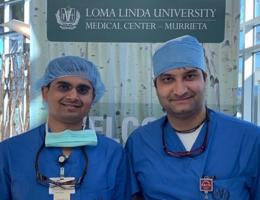
Mitral valve regurgitation is a heart condition where some of your blood flows in the wrong direction, possibly causing serious problems. At Loma Linda University Medical Center – Murrieta, this condition can be treated with the breakthrough procedure MitraClip. MitraClip is also known as transcatheter mitral valve repair, or TMVr.
MitraClip reduces strain on the heart and helps you get back to living your fullest life. The procedure is less invasive (uses fewer and smaller incisions) and can help you if open-heart surgery isn’t right for you.
Why Choose Us for MitraClip
- We are the first hospital in Southwest Riverside County to offer the MitraClip procedure.
- Because MitraClip is less invasive, our patients usually feel less pain, have shorter hospital stays and recover faster.
- You have access to a diverse team of specialists providing expert care, including cardiologists, surgeons, imaging specialists and more.
- MitraClip is one of the many advanced treatments we offer close to home so you don’t have to travel far.

First MitraClip in the Area
What to Expect
For those with mild mitral valve regurgitation, treatment may not be necessary. No matter the severity, though, regular monitoring by a cardiologist is recommended.
When to See a Doctor
Some people with mitral valve regurgitation may have no symptoms for decades. For others, the problem develops quickly and can result in sudden and severe symptoms.
If you’re having the following symptoms of mitral valve regurgitation, talk with your cardiologist:
- Shortness of breath with exertion or when lying down
- Fatigue, especially during times of increased activity
- Lightheadedness
- Cough, especially at night or when lying down
- Heart palpitations (sensations of a rapid, fluttering heartbeat)
- Swollen feet or ankles
- Excessive urination
Do I need MitraClip?
Until recently, open-heart mitral valve replacement surgery was the only treatment option for severe mitral regurgitation. But for some patients, due to age, advanced heart failure or other serious health conditions, open-heart surgery is not an option. If this describes you, MitraClip provides hope in the form of a less invasive treatment.
The MitraClip procedure uses just one small hole in the groin. No chest incisions are needed and neither is a heart-lung machine. With this less-invasive procedure, high-risk patients get effective treatment and can even enjoy a faster recovery.
Take the Next Step
Talk with your cardiologist if you’re concerned about symptoms of mitral valve regurgitation. Your cardiologist can determine if MitraClip is right for you.
To learn more about MitraClip at Loma Linda University Medical Center - Murrieta, call our nurse navigator at 951-290-4314.
